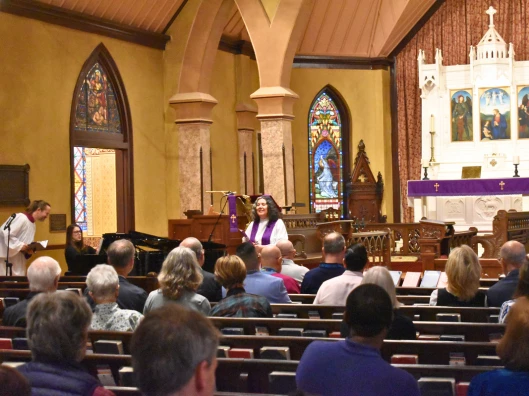
A striking 21st-century hymn paired with a strong and important 17th-century tune provides rich sustenance as we prepare to walk the way of Christ’s Passion.
‘Would you share Christ’s passion’, found in the Episcopal Church’s Hymnal supplement Voices Found – a collection of hymns and music by, about, and in some cases specifically for, women – was inspired by a line from the 13th-century German mystic Mechtild of Magdeburg: ‘Do you want to know my meaning? Lie down in the fire.’ Mary Louise Bringle, a professor of philosophy and religious studies, has spun this into a poem full of powerful images that repays repeated study and meditation and yet remains quite singable – a difficult feat, to be sure. Each stanza begins with a question – ‘Would you share Christ’s passion?’ ‘Would you know Christ’s meaning?’ ‘Would you join Christ’s triumph?’ – and then outlines the devastating means by which the singer-listener-reader might answer in the affirmative. Doubt and fear scourge; Wisdom sears; trials throng: no one who takes this path gets through unscathed. Yet we are promised ‘[Christ] will walk beside you’; ‘none shall now defeat you’. It’s an extraordinary hymn that fits perfectly between St Paul’s yearning profession of faith in Philippians 3 – ‘I want to know Christ and the power of his resurrection and the sharing of his sufferings...’ and the Gospel account of the Anointing at Bethany, which prepares Christ (and us) for his Passion.
The hymn’s singability is greatly aided by its setting to the classic 17th-century German tune ‘Jesu, meine Freude’, and indeed for us the text ‘rescues’ the tune, which is found in the Hymnal 1982 but with a very dated translation of the eponymous German text (unfortunately the much better translation by Catherine Winkworth, the great translator of such hymns, was not chosen). Johann Crüger, the tune’s composer, is known for a number of fine tunes written to carry hymns by several important and beloved Lutheran hymnists of his era. A set of variations for organ on the tune, written by J.S. Bach’s cousin Johann Gottfried Walther, serves as the prelude.
Crüger was also the composer of the tune, ‘Jesus, meine Zuversicht’, that sets our Communion hymn. Like ‘Jesu, meine Freude’, this tune uses the very old German ‘bar’ form, in which the first of two musical phrases is repeated, forming an AAB structure. The text we sing to this tune, ‘Let thy Blood in mercy poured’, sounds so much like a translation of a 17th-century German chorale that it is surprising to learn that the original text which inspired it came from the Eastern Church (the source was not identified by the writer of the English text, John Brownlie) and that it was published in 1907.
If ‘Would you share Christ’s passion’ gives us better words to sing to a good tune, the venerable hymn ‘Fight the good fight’, which echoes a different part of the same Epistle
(‘I press on toward the goal fot he prize of the heavenly call of God in Christ Jesus...’), was likewise given a new lease on life by by 20th-century English composer Eric Thiman, who set it to strong new music. Our Communion anthem is a vigorous setting of the Psalm appointed for the day (126) by early-17th-century English composer Adrian Batten. Jaunty dotted rhythms portray the giddy laughter which the Psalm recounts to have overcome those returning from exile.




Login To Leave Comment